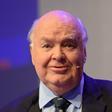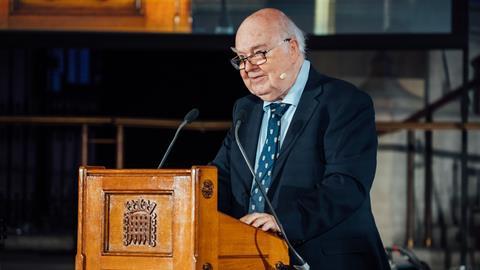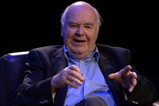Addressing the National Parliamentary Prayer Breakfast in Westminster this morning, the renowned Christian apologist and mathematician Professor John Lennox argued removing God from politics will create a moral vacuum that secularism has no hope of filling. Here are his words in full
One can’t help but notice the growing trend of Christian-sounding values being thrown into political debate.
Earlier this year, Vice President JD Vance and Rory Stewart, got into a very heated debate on X about how a Christian theology of love should be applied to immigration policy. Bible verses and quotes from Augustine and Aquinas were flying everywhere. It seemed as if God was very much back in the public square.
But then, more recently, we’ve heard a forceful articulation of the opposite point of view. MPs with “undeclared religious beliefs” were urged to keep such opinions out of their politics. Public matters should not be influenced by private faith, but by secular reason and evidence. These are two very different views about whether God should be involved in the public square. Which one of them, if any, is right?
My response is twofold. Firstly, everyone brings their faith in something into the public square.
There is a common misunderstanding that faith in God is for people’s private lives. Secular science and reason are for public life. Behind this statement, there are several misconceptions.
The first is that faith in God is necessarily irrational. I can only speak for Christianity, which actually prizes reason and evidence as critically important. For example, the gospel writer John says that he recorded certain words and actions of Jesus Christ as evidence to be investigated so that people might have a basis upon which to put their faith in him and so have eternal life (20:31). Hence, Christianity is an evidence-based faith, a fact that is foundational to many of our great universities.
In that way, it’s very much like science, although we’re often told that we must choose between God and science. But that isn’t true. We no more have to choose between God and science as an explanation for the cosmos than we have to choose between Sir Frank Whittle and science as an explanation for the jet engine. These explanations do not compete or conflict, but complement each other. Both are necessary. God is not the same kind of explanation as science is. God is the explanation of why there is a universe at all in which science, or indeed politics, can be done.
That is why the faith in God of the towering scientific pioneers—Galileo, Kepler, Newton, and Clerk Maxwell—did not hinder their science, but was the motor that drove it. Faith in the scientific endeavour and faith in God make excellent companions. As the late Chief Rabbi Lord Sacks puts it, religion and science are two quite different things, and we need them both. Science takes things apart to see how they work. Religion puts things together to see what they mean.
Removing God from the public square does not leave it in some kind of neutrality
Sensible science, religion, and politics all use evidence-based rational argument. Take the famous example of William Wilberforce and his abolition campaign. The driving force behind it was his Christian conviction—his faith that all human beings were of equal dignity and value because they were made in the image of God. However, his campaign would never have succeeded without the amassing of enormous amounts of factual evidence and reasoning about all aspects of the slave trade.
The second misconception is that secular political thinking is based only on reason and science without any faith dimension. This is very confused. The word “faith” has two meanings. First, it can be used as a shorthand for religion—the Jewish, Christian, and Muslim faiths, etc. Second, it is a synonym for trust, deriving from the Latin fides, from which we get fidelity. In this sense, secularism puts its faith in science and reason to start with.
Beyond that, we all bring into our politics a whole set of beliefs that have been formed by a variety of influences—our family background, our wider social influences, our experiences, our psychology, and yes, our religion too. Each of us has a worldview, an underlying framework of beliefs about life’s biggest questions: What is ultimate reality? What does it mean to be human? Is there purpose to our existence? That worldview influences everything from politics and government to our everyday choices. And this is true whether the worldview is atheistic, Christian, Jewish, Islamic, or shaped by another philosophy or tradition. All of us live out a faith in a worldview, even if we don’t name it.
Polly Toynbee was spot on when she wrote in The Guardian: “Every day in Parliament, fundamentally different worldviews do battle. Politics is all about the clash of moral universes.”
In the latest Theos report, Nick Spencer writes that the real difference, in the end, is not between religious or non-religious arguments for a policy. All arguments are based on faith in a foundational philosophy, which then feeds through to our convictions about the human person, our principles, and finally, our policy thinking. The real difference is between good arguments and bad arguments—between those that are more or less coherent, those that deploy better or worse evidence, those that have more or less robust foundations.
We are still living off the moral inheritance of Christianity
All of us—religious or not—are people of faith, and whether explicitly or implicitly, we bring our beliefs into the public square with us. Everyone does. If people of faith are to be kept out of the public square, then it will be empty. Removing God from the public square does not leave it in some kind of neutrality. No. What happens is that doing God is replaced by doing not God—in other words, allowing the worldview of atheism to dominate, even though we don’t always realise it. As the public square is a melting pot of all manner of worldviews, belief in God should be there alongside the rest.
But I want to further argue that we need Christian faith in the public square. When it comes to values, contemporary Western culture has a serious dilemma. We have high moral ideals. We believe in human equality, freedom, autonomy, and dignity. These values lead us to oppose slavery, racism, human trafficking, antisemitism, eugenics, infanticide, misogyny, and many other kinds of injustice. But these values are not given us by science.
Einstein once said that you can speak of the moral foundations of science, but not of the scientific foundations of morality. So where do we get these values from? Now that is problematic, since much of modern Western secular culture believes that human beings are the products of an impersonal, unguided natural process aimed solely at survival and the replication of our genes.
On that account, moral codes are purely social constructions to promote that objective. There is no moral foundation to protect the weak, the vulnerable, and the victims of injustice. As influential atheist Yuval Noah Harari puts it, “The struggle for survival is indifferent and viciously unequal. Human rights are as fictional as the God who underwrites them.”
That leaves us in a universe that came from nothing, is going nowhere, and has no ultimate meaning. Lord Sacks expressed the dramatic reduction of the value of human beings when we take this view: “You and I are no more than a collection of chemicals, a whole lot of selfish genes blindly reproducing themselves into the next generation. All ideals are illusions. All hopes are destined to be destroyed. And life has no meaning whatsoever.”
This means that secular Western culture does not possess the moral resources to support its high ideals. The 19th-century philosopher Friedrich Nietzsche understood the consequences of jettisoning God. He wrote that when one gives up the Christian faith, one also loses the foundation of Christian morality by breaking one main concept out of it—he said, faith in God—one breaks the whole.
Alexander Solzhenitsyn blamed the horrors of Stalin’s regime on this very loss: “Men have forgotten God.” Or, as a Russian academic once put it to me in Siberia, “We thought we could get rid of God and retain a value for human beings. We were wrong.”
Even Jürgen Habermas, a leading atheist philosopher, recognises that key Western values stem from the Bible. He writes that ideas like human rights, freedom, and democracy are the direct legacy of the Judaic ethic of justice and the Christian ethic of love. Despite secular claims, we are still living off the moral inheritance of Christianity. Everything else, Habermas concludes, is idle postmodern talk.
Historian Tom Holland makes a similar point in his book Dominion. Reflecting on the impact of the New Testament, he writes that almost everything that explains the modern world—concepts like international law and human rights—ultimately don’t go back to Greek philosophers. They don’t go back to Roman imperialism. They go back to Paul. His letters, along with the four Gospels, are the most influential, the most impactful, the most revolutionary writings to emerge from the ancient world.
Habermas and Holland therefore reach the remarkable conclusion that the very values that lie at the heart of all thinking about human beings and Western society—whether religious or secular—actually come from the fundamental teaching of the Bible: that all men and women are of equal value and dignity, since they are created in the image of God.
God is already here
The biblical worldview has played a central role in the rise of the West. Wycliffe’s English Bible in the 14th century and the King James Bible in the 17th made an immense contribution to the English language and culture, to our values, and our great civil institutions—for instance, this House of Parliament. And incidentally, that’s the reason why still today senior politicians are called ministers.
Wycliffe wrote, “The Bible is superior to all human thought. It is from God. It is true. It is the foundation for all society.” So in the Bible and the Christian faith, we do possess a foundation for the public square that secures the values we all hold dear. God is actually in the public square already—although often unrecognised.
Now, even the mention of God in this space makes some people nervous because they fear fundamentalism and extremism. I share that fear because my own family in Northern Ireland has suffered from such violence and oppression. But I don’t only fear religious extremism. I also fear what I saw in the German Democratic Republic and Russia during my many visits during the Cold War and afterwards: that public atheism can be an intolerant, fundamentalist faith that seeks to exercise rigorous social and intellectual control by cancelling all views except its own.
How then do we avoid religion becoming an instrument of oppression? By doing God the way Jesus did, which takes us to his intriguing conversation with the Roman governor, Pilate.
Pilate was afraid—afraid that Jesus posed a political threat to Rome, exactly the kind of oppressive religious regime I’ve just been describing. So, putting Jesus on trial as a terrorist, Pilate asked him if he was a king. Jesus answered, “My kingdom is not of this world. If My kingdom were of this world, My servants would have been fighting that I might not be delivered to the Jews. But My kingdom is not from the world.” (John 18:36)
He explained, “For this purpose I was born, and for this purpose I have come into the world—to bear witness to the truth. Everyone who is of the truth listens to My voice.” (v37) And perhaps Pilate speaks for many when he asks, “What is truth?” (v38) At least he could see that truth cannot be imposed by force, and so he declared Jesus innocent.
Christianity is an evidence-based faith
But what then is the truth about Jesus’ kingship? The answer came when Jesus was later led out to be crucified at a place called Golgotha. Pilate ordered an inscription to be written and fixed on the cross. It read: “Jesus of Nazareth, the King of the Jews.”
Jesus’ biographer John leaves us in no doubt—if we want to understand his kingship, we must look to his cross. We see God incarnate there—not come to condemn us, but to pay the price of our moral failure and open up a way of salvation. A King of ultimate justice, not come to judge, but to bear our judgement himself. Not crushing his enemies, but dying for them out of love. A mighty King giving up his power so that both strong and weak might receive new power to live.
He offers forgiveness, peace, and acceptance with God—not earned by merit, but given freely through repentance and faith. At the heart is this: Christ gave himself for me. In some deep sense, he bore the full weight of my sin and guilt on the cross, and God raised him from the dead as a great declaration that he truly is the Son of God.
Christ is our hope
This Christian message is unique. Jesus competes with no one, since no one else offers us what he does. Truly, truly, he said into a very uncertain world at the time—and he says it again—“The one that hears my word and believes in him that sent me has eternal life and shall not come into judgement but has passed from death unto life.”
Christ is truly our hope in life and death, and that has been the foundation on which my life has been built.
Christians are called upon to be salt and light in the world—to bear witness to the truth by reasoning in the public space, as Jesus and his apostles did, using persuasion and not coercion, never losing sight of the fact that those from whom they differ are fellow human beings made in the image of God.
And if we don’t speak, then maybe even these thousand-year-old stones will cry out: Imago Dei.
John Lennox was speaking at the National Prayer Breakfast in Westminster. The event was hosted by Christians in Parliament in conjunction with partners including Premier.
You can listen to the Parliamentary Prayer Breakfast in full on Premier Christian Radio at 1pm today (repeated at 10pm). Listen at premier.plus





































3 Readers' comments